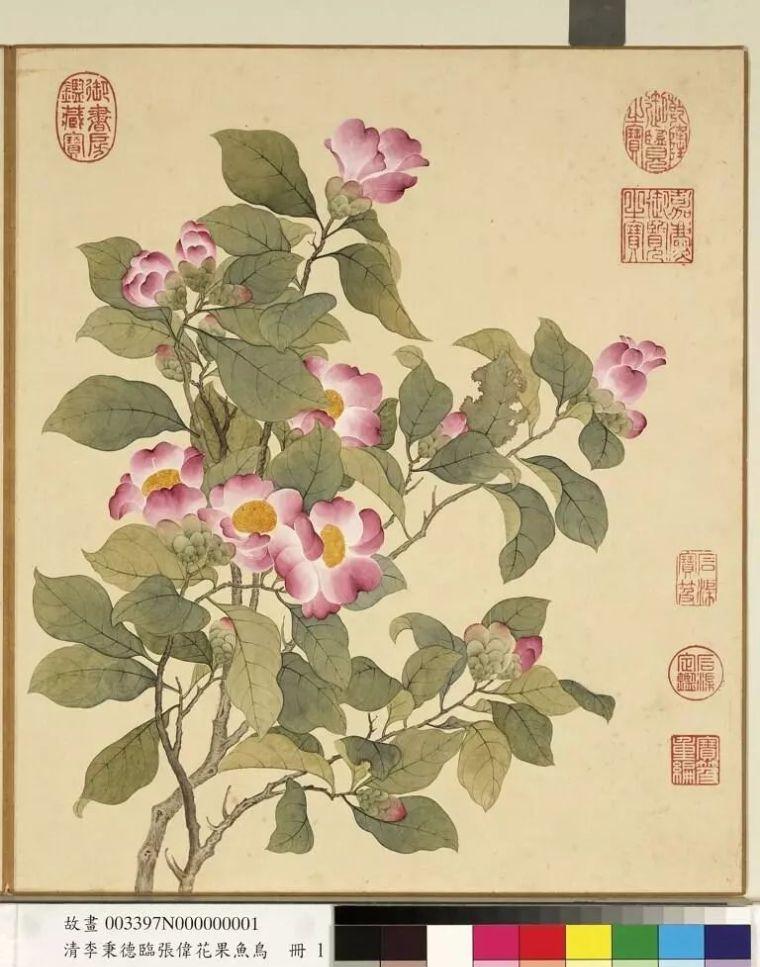Tags: landscape flowers hand-painted watercolor plants
Today to introduce you to a set of beautiful plant paintings in the Qing Palace, this set of albums for the Qing Dynasty painter Li Bingde painted, a total of 24 open, each open depicts one or two kinds of plants, a few depict poultry and fish.
Li Bingde was a painter in Sichuan during the Qianjia period, and during the Qianlong period, he was appreciated for presenting paintings during the Qianlong Emperor's southern tour, and entered the court to paint. There are not many of his heirloom works, the most famous is the set of "Linzhang Wei Flowers, Fruits, Fish and Birds" album introduced today, which is now in the National Palace Museum in Taipei, rarely displayed, here I borrow the electronic pictures of the Palace Museum to show you the beautiful flowers depicted by the ancients.

Camellia flowers bloom in winter, for the famous Spring Festival flowers, often appear in the year map.
Daffodil, ya called "Marigold Yintai", native to the Mediterranean region, this kind of flower that entered China before the Tang Dynasty, because it can be opened during the Spring Festival by adjusting the temperature, is also a classic annual flower, often a few daffodil bulbs are cultivated in the Qingshui basin bowl, quite elegant, also known as "Lingbo fairy".
Although chrysanthemums bloom in autumn, Chinese can control their opening during the Spring Festival by adjusting the length of light, and chrysanthemums are still used in Guangdong.
Although the hydrangea flowers are summer flowers and grasses, but because the seeds are easy to germinate, they can also be cultivated in winter, And Chen Shuzi's "Flower Mirror" says: "(Fengxian) flowers are cold in winter, and the fire of the plant is also born."
Brocade flowers, flowers and shrubs that bloom in spring, have long branches and resemble brocade rings when in full bloom.
Bergamot, a famous ornamental fruit, is most famous for its production in Jinhua, Zhejiang Province, because the heart skin separates during the growth of the fruit, thus forming a finger-like split.
Hollyhock, also known as the Dragon Boat Festival, often blooms around the Dragon Boat Festival, is a famous noon flower; hollyhock plants are tall, the top advantage is obvious, and the red flowers are called "Yizhang Red". Because hollyhocks and hydrangeas are extremely easy to grow, the ancients scorned them as "the second wife in the painting".
peach blossom
Pear blossoms, this figure depicts white pear blossoms in the hazy moonlight, reminiscent of the "pear blossoms with the moon" where Xue Baochao lived in "Dream of the Red Chamber".
Wax plum and Luo Han Pine, wax plum bloom in winter, Luo Han Pine is emerald green all year round, and the two plants are commonly used flower materials for flower arrangements in the year dynasty.
Chinese Lingxiao, ancient called female Weihua, but this traditional Lingxiao, the garden has been uncommon, now the most used is the thick calyx Produced in the Americas Lingxiao.
Thick Calyx Lingxiao (Image from the Internet)
Yingshan red, a common species in rhododendrons, is the easiest to identify because of the low altitude of Yingshan red distribution, and is also the most common species in ancient paintings.
Peony, the trumpet "Flower King", opens during the rainy season of the valley, and is the most traditional flower with Chinese characteristics.
Begonia, according to legend, is transformed by the tears of si woman, a kind of yin-loving flower, with a red back and a chic flower when it blooms.
Wisteria, also known as "wisteria rose", when in full bloom like a purple waterfall, in traditional painting wisteria and goldfish match each other, elegantly called "purple silk gold medallion", meaning official luck and prosperity.
There are two kinds of lilies, the white one is the lily, and the orange one may be Wodan.
The ornamental poppy with heavy petals is called Aphrodite in ancient times. Ornamental poppies were a common flower in ancient times, but due to the damage caused by opium to Chinese history, this beautiful flower is also regarded as a "snake beauty" and has rarely been seen again.
Cherry, the earliest type of ripe fruit in the rosaceae family, has the "first fresh in May" elegance.
Southern Heavenly Bamboo, the leaves turn red in winter, especially under the white snow, its bunches of red fruits appear crystal like pearls, Southern Heavenly Bamboo is the most commonly used flower and tree in the New Year's Festival, and the image of southern Heavenly Bamboo in the New Year painting is like a time indicator plant.
Lentils with white wagtails
Caryophyllum, dogtail, barnyard, butterfly, butterfly and pink butterfly
The white bird, its image appears on the traditional Ming and Qing dynasty civil official supplements.
White Oriole Complement (Image from the Internet)
Diamond horns and various aquariums
In addition to the "Linzhang Wei Flower, Fruit, Fish and Bird Picture" album, another similar set of flower and bird painting albums "Manting Fanghuatu" album of Li Bingde appeared at the spring Chinese art night auction of Central Auction Co., Ltd. in Tokyo, Japan in 2014.
lily
Peach
Tea
hibiscus
lotus
begonia
peony
Camellia, daffodils
hollyhock